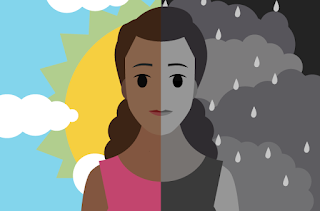Bipolar disorder causes mood, energy, and activity levels to fluctuate. Which can make day-to-day life challenging.
Bipolar disorder can severely disrupt life. Although each person experiences it differently.
Many people with this illness have fulfilling lives with the right care and assistance.
Concept of Bipolar Disorder
We have formerly known manic depression as bipolar disorder. Bipolar Disorder is a mental health illness that results in sharp mood swings.
Including emotional highs (mania or hypomania), and lows (depression).
When you experience depression, you could feel melancholy or hopeless and stop enjoying or being interested in most activities.
You might experience mania or hypomania (a less severe form of mania). which can make you feel euphoric, energized, or excessively irritable.
These mood changes can affect the ability to think clearly. Mood swing episodes can happen infrequently or repeatedly each year.
While most people will have some emotional symptoms in between bouts, some people might not.
Although bipolar disorder is a lifelong diagnosis, by adhering to a treatment plan. You can control your mood swings and other symptoms.
Mostly, psychotherapy and drugs are used to treat bipolar disorder (psychotherapy).
Treatment of Bi-Polar Disorder
The aim is to enable the person to carry out daily activities successfully. Without the interference of one's mental illness.
They used a variety of therapies throughout treatment, including:
- Counseling
- Medication
- Lifestyle remedies
- Becoming an inpatient
Finding a good diagnosis and treatment can take some time. Because everyone responds differently and symptoms vary.
➡ Psychotherapy and counseling
The person can learn the following through cognitive-behavior therapy (CBT) and other methods:
- Identify major triggers and take action to mitigate them, such as stress.
- Focus on things that can keep your mood consistent for as long as workable.
- Understand and watch the early warning signs of an incident and take action to control it.
- Get the help of family, friends, and coworkers
These actions can assist someone in preserving healthy connections at home and at work.
A doctor might advise family therapy for bipolar illness in children and teenagers.
➡ Medication (Drug Rehab)
Drug therapies can support mood stabilization and symptom management. A doctor will frequently recommend a mixture of:
- Second-generation antipsychotics (SGAs)
- Lithium antidepressants
- Drugs for anxiety or sleep
- Anticonvulsants, mood stabilizers to treat mania
Over time, the medicine may need to be changed by the doctor. The side effects of several medications vary from person to person.
A patient should speak with their doctor if they have questions about their pharmacological therapy.
Also, to lower the possibility of interactions and negative effects. Let the doctor know about any additional medications you're taking.
Heed the advice of the physician in relation to medicine and therapy. Discuss any worries about side effects.
And if you believe their therapy is working, keep taking their prescription until your doctor says it is safe to stop.
Keep in mind that it may take some time for the drugs to take effect.
If a patient stops taking medication, symptoms can get worse.
➡ Lifestyle Remedies
Some lifestyle decisions can support symptom management and mood stabilization. lifestyles such as
- Keeping a consistent schedule
- Establishing a regular sleeping schedule
- Eating a balanced
- Taking precautions to avoid sleep disruption
- Exercise on a regular basis
However, some people use supplements. But it's important to first talk to your doctor about it.
Also, note that some complementary treatments may interact with bipolar disorder medications. They might exacerbate symptoms.
➡ Becoming an in Patient
If there is a possibility that they might hurt themselves or others. Some people might need to spend some time in the hospital.
Electroconvulsive therapy is a treatment option that a doctor may recommend if other options have failed (ECT).
READ ALSO:
Frequently Asked Questions Bi-Polar Disorder
1. What is a Bipolar Person Like?
Both episodes of severe depression and episodes of mania.
Overwhelming joy, excitement, or enthusiasm, tremendous energy, a decreased need for sleep, and fewer inhibition.
are experienced by people with bipolar disorder.
Bipolar disorder is a highly individual experience. No two people's experiences are identical.
2. What are the 4 Stages of Bipolar?
Mania, hypomania, depression, and mixed episodes.
are the four different types of mood episodes that can occur with bipolar disorder.
3. What Causes a Person to Become Bipolar?
Genes.
According to research, the fact that bipolar disorder frequently runs in families.
And that some people are more predisposed to the condition than others are due to certain genes.
However, no single gene can cause the condition. Multiple genes are involved.
4. What Age Does Bipolar Start?
Although bipolar disorder can affect anyone at any age.
They often discover it in adolescence or the early 20s.
Symptoms might change over time and from one person to the next.
5. How Do You Test if You are Bipolar?
When assessing mood symptoms during the clinical interview.
Your doctor may ask you to complete a mood questionnaire or checklist to assist guide the discussion.
In order to rule out other potential reasons for your symptoms.
your doctor may also request blood and urine testing.
It's tough to live with BD. For some, it may be beneficial to approach the illness as a neuro-divergence.
Rather than a disability, in order to better understand their treatment and focus on their strengths.
Even those with more severe types of the ailment can typically benefit from long-term treatment.
A person may also discover that altering their habits, and way of life helps with symptoms.
Exercise and maintaining a balanced diet can be part of this.
A person with BD can have an excellent quality of life with the right treatment.








